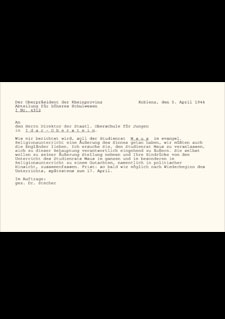Denunciation and Persecution
An incident, which grew into a tragedy for Georg Maus, occurred in the spring of 1944. In religion class for the lower grade, Maus dealt with a story of a missionary and pointed out that the acceptance of Jesus’s commandment to love one’s enemies had curbed vendettas and tribal feuds among primitive peoples and this alone had led to the development of the gifts of creation residing in them.
In the discussion following, a student asked whether the commandment to love one’s enemies also applied to the English who were bombing German cities when Goebbels after all had said they were to be hated. Without hesitating, Maus answered that Jesus Christ commanded this and it could not be retracted one bit.
In April of 1944, a complaint against Maus was lodged with the administrative president of the Rhine Province, department of secondary education in Koblenz. The agency followed up the matter rigorously. The principal in Idar-Oberstein was asked already on April 5 to obtain a statement from Maus. The principal was additionally supposed to give his views on Maus and submit an assessment, in particular of his political views.
In his report of April 15, 1944, the principal confirmed that Maus had orthodox Christian views; as a Bible-believing Christian, he perceived a world in National Socialism’s weltanschauung, which was foreign to him (Loscher, Hahn, Ich habe nicht verleugnet, 35). He averred that Maus’s views did not meet with acceptance among the children, however. He had instructed him to refrain from making such comments in the future.
Despite this placatory report, Maus was nevertheless arrested in the middle of class by two Gestapo agents on May 16, 1944 and, without being allowed to see his family, was first taken to city hall in Idar-Oberstein for initial questioning. Effective May 17, 1944, he was suspended from his job until his imminent transfer. At the same time, the questioning of his students began. Maus himself was then brought to pretrial detention in Koblenz. He was allowed to notify his family for the first time on May 18, 1944
Source / title
- © Quoted from: Loscher, Hahn, Ich habe nicht verleugnet, 34; Verlag P. Hammer

